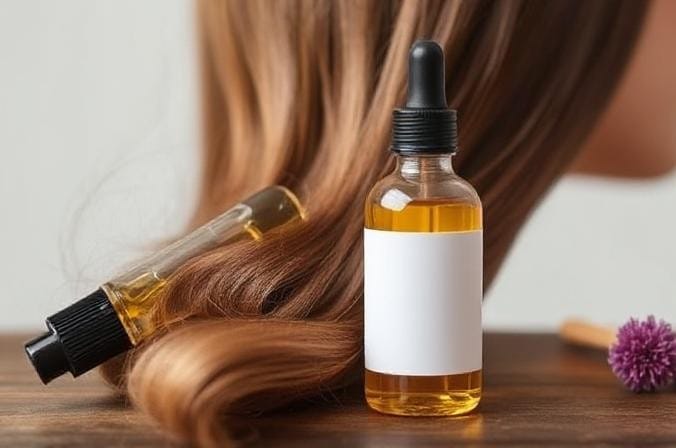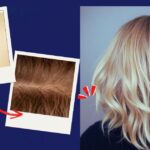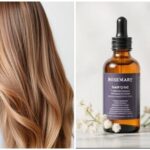Why There’s So Much Buzz About Biotin Hair Oil
If you’ve spent time searching for ways to help thinning hair, dryness of the scalp, or lackluster hair, you’ve probably seen biotin hair oil. So is biotin hair oil just a beauty fad, or is this the next big thing based on real science? We interviewed dermatologists, reviewed clinical studies, and researched consumer reviews to find out. Here are the results. Spoilers; the results may surprise you.
What is Biotin Hair Oil?
Biotin, a.k.a. vitamin B7, is a water-soluble vitamin involved in keratin production, the primary protein of your hair, skin, and nails. Biotin hair oils generally combine biotin with carrier oils, like coconut, argan, or castor oil to better absorb into the scalp while also nourishing your hair.
The Benefits of Biotin Hair Oil (What Dermatologists Say)

1. Supports Thicker, Stronger Hair
“Biotin helps keratin structure, which makes strands more robust and less prone to breakage,” says Dr. Melissa Burnstein, a board-certified dermatologist in Los Angeles.
Stat to Note: A 2017 study in the Journal of Clinical and Aesthetic Dermatology found women with thinning hair grew significantly more hair, and the thinning of their hair became less apparent, after taking biotin supplements.
2. Improves Scalp Health
A healthy scalp taps into healthy hair. Biotin oils contain anti-inflammatory oils such as tea tree or jojoba oils that help reduce dandruff and also help to unblock clogged hair follicles.
3. Aids in preventing hair breakage and split ends
Biotin oils have an abundance of vitamin-rich base oils within the serum structure to create a water-resistant seal to the hair cuticle protecting it from ongoing friction and damage/blunt ends from combing and styling.
4. Better shine and texture
Many users have reported they were able to achieve shinier/smoother hair with regular use of biotin oils. The oils include fatty acids such as argan oil and almond oil that improve hair texture when combined with biotin oils.
How to Use Biotin Oil for Hair: A Five-Step Process
Step 1: Warm the Oil
Duchess will require 2-3 tablespoons of biotin oils to do an effective hair treatment, so that is what you need to measure into a small bowl. Just warm the bowl in the microwave slightly (take care not to overheat the oil). Warming the oil helps to improve absorption to the scalp.
Step 2: Massage into scalp
With your fingers, massage the oil into the scalp with a circular motion for approximately 5-10 minutes. This should serve to stimulate blood circulation to the scalp and hair follicles. Use your fingers to distribute, not the palm of your hand.
Step 3 – Distribute through hair
Use a wide tooth comb to distribute the oil evenly through the hair from root to tip.
Step 4: Leave it in
Leave it in for a minimum of 30-minutes, if you want to really nourish your hair leave it in overnight.
Step 5: Wash and rinse
Make sure to wash out the conditioning oil thoroughly with shampoo. Use conditioner again after washing out with shampoo. Do this process 2-3 times per week.
Real-World Applications: User Testimonials
Example: Amanda, 34, Austin, Texas – present in 2 months of twice-a-week biotin hair oil, 40% reduction in hair shedding.
Review “Since I started the biotin oil, my hair is seems thicker and grows faster. My stylist has even noticed!.”
Good Biotin Hair Oils to Buy
OGX Biotin & Collagen Oil Mist – lightweight, professional quality
Mielle Rosemary Mint Scalp & Hair Strengthening Oil – contains biotin and other essential oils
HerStyler Hair Repair Serum with Biotin – great for heat-damaged paired hair
Maple Holistics Biotin Hair Oil – all natural and budget friendly
Takeaway: Will you try biotin hair oil?
If you have thinning hair, split ends, or simply want shiny, soft hair, biotin hair oil is worth trying. With scientific support and user love around the world, there is a unique mix of protection and nourishment in biotin hair oil. Just be consistent!!
FAQs
1. Is biotin oil superior to biotin supplements?
Topical biotin is applied directly to the scalp and does not require digestion by the system, possibly leading to fewer side effects compared to an oral supplement.
2. Can biotin oil produce breakouts?
If you are prone to acne, I would choose non-comedogenic oils such as jojoba oil to help prevent clogged pores.
3. When can I expect to see results?
Most users experience visible results after 6-8 weeks of consistent use.
4. Can I use biotin oil on colored or chemically-treated hair?
Yes! Biotin oil is safe to apply on color-treated or chemically treated hair and may even help repair damage done by heating tools or color treatments.
5. Can men use biotin hair oil?
Better yet, yes! Biotin hair oil benefits everyone equally and will help promote hair regrowth for men who are showing early signs of thinning.
6. How often should I apply biotin hair oil?
Most hair types will respond well to 2-3 times per week.
7. Can I mix biotin oil with other oils?
Absolutely! This can boost the effectiveness, try castor, coconut, or rosemary oil.












